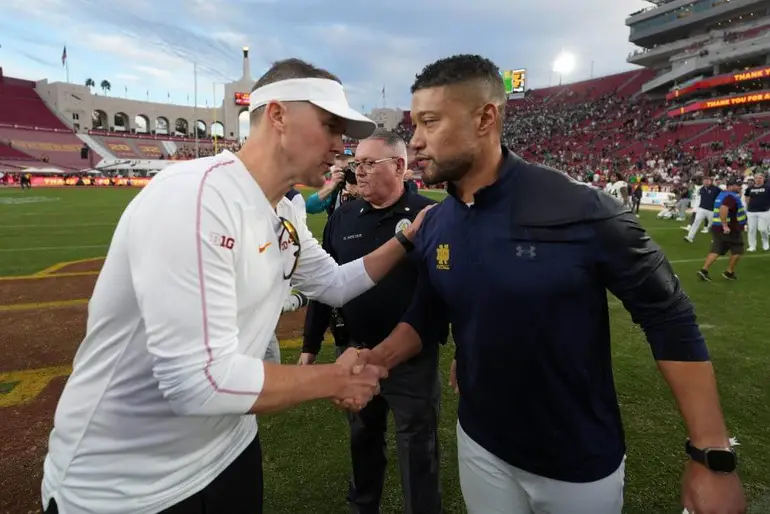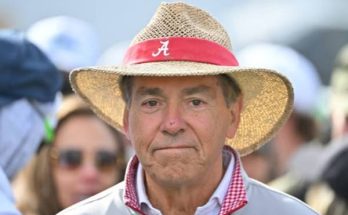The Notre Dame-USC rivalry is one of college football’s most storied and cherished traditions. For decades, fans from both sides have anticipated the annual matchup with fervor, celebrating the pageantry, intensity, and history behind these two powerhouse programs clashing on the gridiron. Yet, in recent years, questions have emerged about whether this iconic rivalry should continue, particularly given shifting college football landscapes, scheduling challenges, and changing priorities within programs. Notre Dame’s head coach Marcus Freeman has now weighed in with his clear stance, adding a vital voice to the ongoing discussion.
Marcus Freeman stepped into the spotlight at Notre Dame amid great expectations. Known for his defensive acumen and charismatic leadership, Freeman has quickly become the face of the Fighting Irish’s resurgence. His approach to the program reflects a deep respect for Notre Dame’s traditions and history, but also a pragmatic awareness of the demands and realities of modern college football. When asked about the Notre Dame-USC rivalry, Freeman did not hesitate to make his feelings clear: the rivalry matters, and it should continue.
The roots of the Notre Dame-USC rivalry run deep. Dating back to their first meeting in 1926, the Fighting Irish and the Trojans have played each other nearly every year since 1926, except for a brief hiatus. This rivalry represents more than just football; it’s a clash of cultures and values, as Notre Dame embodies a Midwestern, Catholic, academic powerhouse, while USC reflects a West Coast, diverse, and Hollywood-infused identity. Over the decades, the rivalry has produced iconic moments, legendary players, and dramatic finishes that have become etched into college football lore. The annual meeting often carries national championship implications and has been a barometer for greatness in the sport.
Despite its historic significance, the rivalry has faced challenges in the 21st century. The evolving college football landscape—with conference realignments, playoff expansions, and increased emphasis on player welfare—has made scheduling non-conference rivalries more complicated. Notre Dame, as an independent program, has enjoyed the flexibility to craft its own schedule, but that freedom has also introduced questions about the feasibility of maintaining such a high-profile rivalry annually. USC’s move into the Big Ten Conference further complicates the logistics of keeping the rivalry alive in its traditional form.
Some critics argue that the Notre Dame-USC rivalry has lost some of its competitive edge, pointing to lopsided results or seasons where one team was clearly outmatched. Others suggest that the teams’ geographic separation and conference obligations diminish the rivalry’s relevance. But to Marcus Freeman, these arguments miss the heart of what the rivalry represents. He sees it as a defining feature of Notre Dame football, something that inspires players, coaches, and fans alike.
When Freeman speaks about the rivalry, there is a palpable sense of reverence. He understands that this game is a unique opportunity to test his team against one of the nation’s best and to honor the legacy of those who came before. For him, it’s not just about wins and losses—it’s about pride, identity, and the competitive spirit that drives Notre Dame football forward. “This rivalry is part of what makes Notre Dame football special,” Freeman has said in interviews. “It’s a tradition that we want to continue because it brings out the best in our program and challenges our players in ways that no other game can.”
Freeman’s stance also reflects a broader understanding of the role rivalries play in college football’s cultural fabric. Rivalries are often the lifeblood of the sport, connecting generations of fans and creating lasting memories. For Notre Dame, maintaining a rivalry with USC is a way to preserve a link to the program’s historic past while also building excitement for the future. “We’re not just playing a game,” Freeman explained. “We’re carrying on a legacy, and that’s something special for our players and our fans.”
Beyond tradition, the Notre Dame-USC rivalry has tangible benefits for both programs. The matchup attracts significant national attention, boosting television ratings and recruiting appeal. Players want to compete on the biggest stages, and the rivalry game offers that spotlight every year. From a recruiting perspective, Freeman recognizes that the rivalry helps Notre Dame stand out in a crowded college football marketplace. Prospective student-athletes often cite the opportunity to play in historic games like Notre Dame-USC as a major draw when making their decisions.
Moreover, Freeman acknowledges that rivalry games bring out a heightened level of preparation and intensity that can elevate a team’s performance throughout the season. The players understand the magnitude of the matchup, and the coaching staff can use the rivalry as a motivating tool. “Rivalry games force you to be at your best,” Freeman noted. “They push us to work harder, focus more, and compete with a sense of urgency that’s unmatched.”
Despite his clear support for continuing the rivalry, Freeman is also mindful of the practical realities involved. The scheduling challenges are real, and both programs need to navigate conference commitments and long-term planning. Yet, he remains optimistic that Notre Dame and USC can find a way to preserve the rivalry in some form, whether as an annual contest or through periodic showdowns. The desire to keep the tradition alive runs deep on both sides, and Freeman is committed to making sure Notre Dame honors that commitment.
Freeman’s stance also highlights the importance of leadership in shaping the future of college football traditions. As a relatively young head coach, he brings fresh perspective and energy to Notre Dame’s program. His openness to dialogue and collaboration with USC’s coaching staff demonstrates a willingness to work together for the greater good of the sport. This collaborative approach is vital, especially as college football continues to evolve rapidly with new playoff formats, NIL (Name, Image, and Likeness) opportunities, and transfer portal dynamics changing the landscape.
The Notre Dame-USC rivalry is more than just a game; it’s a celebration of history, competition, and identity. Marcus Freeman’s clear stance underscores how much the rivalry means to Notre Dame’s football culture and how it fits into the larger picture of college football’s rich traditions. While the future may bring changes to how often and where the teams meet, Freeman’s commitment ensures that the rivalry will remain a cornerstone of Notre Dame football for years to come.
In the end, the question of whether the Notre Dame-USC rivalry should continue is answered emphatically by Marcus Freeman. Yes, it should. The rivalry is a defining feature of both programs, a source of pride for players and fans, and a celebration of college football’s enduring spirit. Through Freeman’s leadership and vision, the Fighting Irish are poised to honor this tradition while adapting to the modern era, ensuring that the rivalry’s flame continues to burn bright.
For the fans who have followed the Fighting Irish and the Trojans over the decades, Freeman’s stance is reassuring. It signals that the heart and soul of college football rivalries are alive and well, even in an age of constant change. As Notre Dame and USC prepare to face off again, supporters can take comfort in knowing that their passion, history, and loyalty remain at the forefront of what makes this rivalry truly special.



